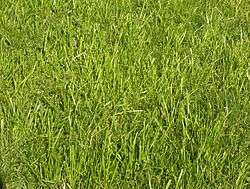grass
English
Etymology
From Middle English gras, gres, gers, from Old English græs, gærs (“grass, blade of grass, herb, young corn, hay, plant; pasture”), from Proto-Germanic *grasą (“grass”), from Proto-Indo-European *gʰreh₁- (“to grow”).
Cognate with Scots girs, gers, gress (“grass”), North Frisian gäärs, geers (“grass”), Saterland Frisian Gäärs (“grass”), West Frisian gers (“grass”), Low German Gras (“grass”), Dutch gras (“grass, turf, pasture”), German Gras (“grass, weed”), Danish græs (“grass”), Swedish gräs (“grass”), Norwegian Bokmål gress (“grass”), Faroese, Icelandic and Norwegian Nynorsk gras (“grass”), Latin herba (“plant, weed, grass”), Albanian grath (“grass blade, spike”). Related to grow, green.
Pronunciation
- enPR: gräs, IPA(key): /ɡɹɑːs/
- (Received Pronunciation) IPA(key): [ɡɹ̠ɑːs]
- (General Australian, General New Zealand) IPA(key): [ɡɹ̠äːs~ɡɹ̠ɐːs]
Audio (UK) (file)
Audio (file) - Rhymes: -ɑːs
- enPR: grăs, IPA(key): /ɡɹæs/
- (US, Canada) IPA(key): [ɡɹ̠æs~ɡɹ̠ɛəs~ɡɹ̠eəs]
- (Northern England, Ireland) IPA(key): [ɡɹ̠as~ɡɹ̠æs]
Audio (US) (file) - Rhymes: -æs
Noun

grass (countable and uncountable, plural grasses)
- (countable, uncountable) Any plant of the family Poaceae, characterized by leaves that arise from nodes in the stem and leaf bases that wrap around the stem, especially those grown as ground cover rather than for grain.
- 1913, Joseph C. Lincoln, chapter 1, in Mr. Pratt's Patients:
- 'Twas early June, the new grass was flourishing everywheres, the posies in the yard—peonies and such—in full bloom, the sun was shining, and the water of the bay was blue, with light green streaks where the shoal showed.
-
- (countable) Various plants not in family Poaceae that resemble grasses.
- (uncountable) A lawn.
- (uncountable, slang) Marijuana.
- (countable, Britain, slang) An informer, police informer; one who betrays a group (of criminals, etc) to the authorities.
- (uncountable, physics) Sharp, closely spaced discontinuities in the trace of a cathode-ray tube, produced by random interference.
- (uncountable, slang) Noise on an A-scope or similar type of radar display.
- The season of fresh grass; spring.
- (Can we date this quote?), Latham, (Please provide the book title or journal name):
- two years old next grass
-
- (obsolete, figuratively) That which is transitory.
- Bible Is. xl. 7
- Surely the people is grass.
- Bible Is. xl. 7
- (countable, folk etymology) Asparagus.
- 1769, Hannah Glasse, The Art of Cookery made Plain and Easy, 9th edition, page 195:
- 'Have ready a hundred of ſmall graſs boiled, then ſave tops enough to ſtick the rolls with, the reſt cut ſmall and put into the cream, fill the loaves with them.'
-
Synonyms
- (Poaceae): Gramineae (alternative name), or see Thesaurus:grass
- (marijuana): See Thesaurus:marijuana
- (informant): See Thesaurus:informant
- (spring): breakup, spring, springtime
- (that which is transitory): ephemera
Derived terms
- Aleppo grass
- Antarctic hair grass
- beachgrass
- bentgrass, bent grass
- Bermuda grass
- bluegrass
- bluestem grass
- deergrass
- gama grass
- goatgrass
- goosegrass
- goosegrass
- grassbird
- grass box
- grass court
- grasscutting
- grasscycle
- grasseater
- grassfinch
- grass fire, grassfire
- grass-green
- grass hockey
- grasshook
- grasshopper
- grass jelly
- grassland
- grassless
- grasslike
- grass of Parnassus
- grassplot
- grass roots
- grass script
- grass skirt
- grass snake
- grass top
- grass trap
- grass tree
- grass widow
- grass widower
- grasswren
- grassy
- Johnson grass
- kick into the long grass
- lemongrass
- let the grass grow under one's feet
- marsh grass
- muttongrass
- pinegrass
- quackgrass
- redtop grass
- ryegrass
- scutch grass
- smutgrass
- spear grass, speargrass
- squirrel grass
- supergrass
- sweetgrass
- Sweet Grass County
- switchgrass
- wiregrass
- witchgrass
- yardgrass
Translations
|
|
|
|
|
|
See also


Verb
grass (third-person singular simple present grasses, present participle grassing, simple past and past participle grassed)
- (transitive) To lay out on the grass; to knock down (an opponent etc.).
- 1893, Arthur Conan Doyle, The Naval Treaty, Norton, published 2005, page 709:
- He flew at me with his knife, and I had to grass him twice, and got a cut over the knuckles, before I had the upper hand of him.
-
- (transitive or intransitive, slang) To act as a grass or informer, to betray; to report on (criminals etc) to the authorities.
- (transitive) To cover with grass or with turf.
- (transitive) To expose, as flax, on the grass for bleaching, etc.
- (transitive) To bring to the grass or ground; to land.
- to grass a fish
Synonyms
- (to lay out): flatten, floor, lay low, lay out, knock down, knock out, knock over, strike down
- (to act as an informer): See Thesaurus:rat out
Translations
|
|
Cimbrian
References
- Umberto Patuzzi, ed., (2013) Ünsarne Börtar, Luserna: Comitato unitario delle linguistiche storiche germaniche in Italia / Einheitskomitee der historischen deutschen Sprachinseln in Italien